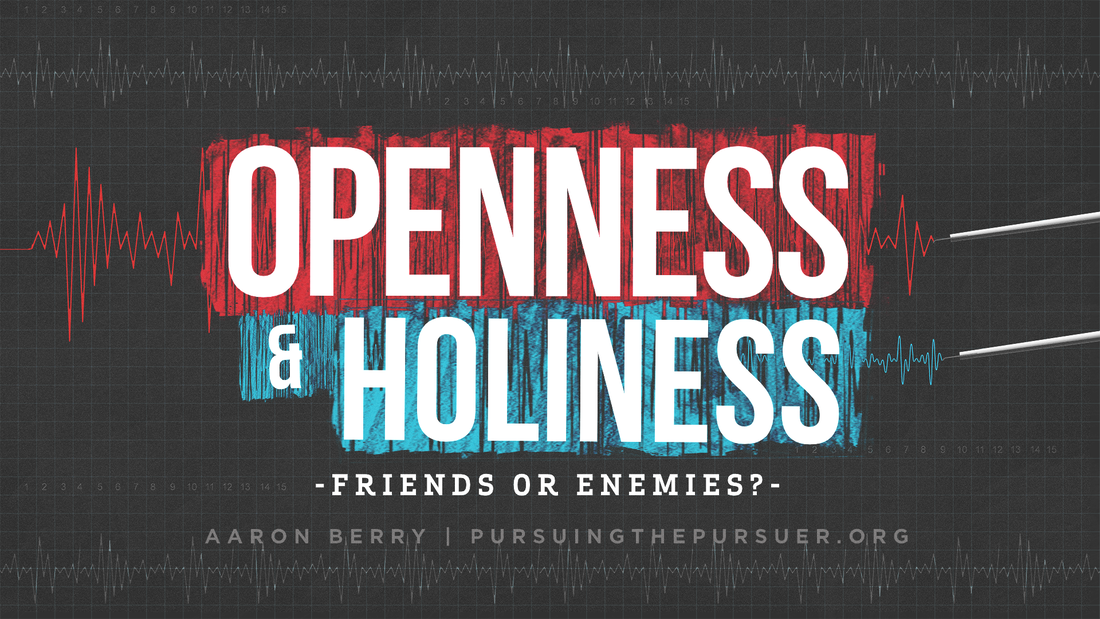|
Maybe it’s just me, but have you ever noticed that Christians who heavily emphasize holiness often lack openness and honesty? Have you ever noticed that Christians who heavily emphasize openness and honesty often lack holiness? One church seems to be filled with people who seem to have it all together, but who never bear the burdens of others or share their own. They keep to themselves, play the part, and mind their own business. Another church is open, friendly, inviting, and ‘real,’ but never takes holiness too seriously. “Rawness” is elevated above righteousness. Openness and Holiness—are they friends or enemies? Getting ‘Holiness’ Wrong Openness becomes the enemy of holiness when we have a wrong understanding of holiness. What is holiness? When we speak of God’s holiness, we’re talking about his distinction from creation, separateness, uniqueness, moral perfection, glory, and beauty. God is a holy God. However, when we define holiness in our own lives, it takes on a slightly different nuance. Holiness in the life of a Christian has two main components: a holy standing (1 Cor 1) and a holy calling (1 Peter 1; 2 Cor 7:1). We are set apart unto God and we are called to moral purity. From the moment of conversion to the end of life, Christianity is a life of faith and repentance--of wanting Jesus more and hating sin more. Holiness in the life of the Christian is not perfection (1 John 1:8, 10), neither is it appearance (Matt. 23:23-28). Yes, inward transformation will impact outward appearance, but outward appearance can easily be faked to create the appearance of inward transformation. And this is where we so often stray in the Christian life. It’s possible to look “holy” without wanting Jesus more and hating sin more. This is what the Pharisees were good at. Everyone assumed the Pharisees were righteous and loved God, but they were “full of dead men’s bones.” When holiness is only skin-deep, the walls go up. And when this type of “holiness” pervades the church, no one feels safe to share their burdens or reach out for help. Admitting such shortcomings ruins the appearance you’ve worked so hard to create. When we live as if holiness is nothing more than perfect appearance, openness becomes the enemy—a threat to our performance. Swapping Holiness for Openness It’s not uncommon for someone to become disillusioned, hurt, and embittered from this wrong view of holiness. It’s the human tendency, when reacting against legalism and hypocrisy, to remove any semblance of holiness in a church in exchange for “rawness” and “authenticity”—to make up for the absence of openness by making it all about openness. In this extreme overreaction, openness becomes the goal—the ultimate form of righteousness, and holiness becomes the enemy of that openness. Repentance is downplayed and confrontation is discouraged while believers sympathize with each other’s struggles and sins. Christians start describing themselves more as “wretches” and “sinners” than they do “saints.” Openness becomes both the means and the end. This latter version of Christianity is just as dangerous as the former. So, how do we make openness and holiness friends instead of enemies? Pursuing Holiness through Openness I’m convinced that there is a better way—a way in which holiness is elevated and openness is practiced. While one church wrongly defines holiness and the other church wrongly makes openness the ultimate goal, a more balanced and biblical approach exists that weds both openness and holiness together in perfect harmony. When we begin with a correct view of holiness, openness fits in perfectly. Pursuing holiness for the Christian is not perfect appearance--it’s wanting Jesus more and hating sin more. So, what does healthy openness look like in a church that correctly understands holiness? Let’s approach this question by considering four major obstacles to openness in a church:
What you do with these four obstacles reveals what you consider to be the goal of the Christian walk. In an “openness only” church, where “rawness” is elevated above righteousness, these four obstacles need to be destroyed. Many people in these churches have come out of environments where they were embarrassed to admit their own faults while under the constant barrage of legalistic demands for performance. So, the “openness only” church tries to minimize these obstacles:
To someone coming out of a legalistic church, this model appears very attractive. It claims to provide the openness that they have been deprived of for so long. The problem is, this model doesn’t get you any closer to Christ. You may feel like you’re loving Jesus more, but you’re not hating sin more. When a church is defined by a pursuit of genuine holiness—loving Jesus more and hating the sin that gets in the way—a healthy, genuine openness becomes an essential means to pursue that holiness. So, what does this type of church do with these four obstacles?
Openness is a difficult, vulnerable, uncomfortable road. But it’s also a necessary one. And if a church is full of people who share the goal of loving Jesus and hating sin, it can be uncomfortable together. It will be messy, because sin must be exposed in order to be defeated. Do we air out our dirty laundry because we know it will be masked by the combined stench of those around us, or because we want Jesus Christ to wash us clean? It will be purposeful, because although the process is messy, the goal is to become less messy. We are being transformed into the image of our Savior, Jesus Christ. We confess openly because we must. We do so intentionally to allow other Christians to speak grace and truth into our lives. It will be safe, because we all know that we are hopeless without Jesus Christ. The Church must be a place where honest growth can happen. By “safe,” I don’t mean to say that there should be no consequences or that it won’t be risky. I mean that if a church is defined by its pursuit of genuine holiness, it will recognize that honest confession is part of that pursuit. Honesty and openness will not be a surprise or a shock to anyone. The local church is meant to be a gathering of people who all have the same goal: wanting Jesus more and hating the sin that gets in the way. We are called to build up the church by “speaking the truth in love” (Eph 4:15). We are commanded to “bear one another’s burdens” (Gal 6:2). We are to “consider how to stir up one another to love and good works” (Heb. 10:25). If this is your desire, then plug yourself into a church, not one that defines holiness as performance or elevates openness as the goal, but one in which you can be personally involved in open, messy, purposeful discipleship designed to push others and be pushed toward Jesus Christ.  Aaron Berry earned both his undergrad and MA in Bible at Bob Jones University and most recently completed his MDiv at Detroit Baptist Theological Seminary in Allen Park, MI, where He and his wife Hanna, currently live with their two children, Brooklyn and Joshua. He also serves as the Director of Recruitment at DBTS and is a pastoral assistant at Inter-City Baptist Church.
3 Comments
Cherilyn Berry
2/4/2020 09:04:12 pm
I really appreciate your thoughts and how you developed and presented them, Aaron. Because I am very familiar with your background, this rings very true!
Reply
josh cheney
5/3/2020 10:46:48 pm
Concise, solid, optimistic. God honouring. Love Jesus more, hate sin more. Simple basic deep. God's Kingdom come in us and through us.
Reply
Leave a Reply. |
Popular ArticlesThe Problem With Christian Trump Supporters
How to Have Personal Standards Without Being a Legalist The Heart of Modesty Stop Trying to Reach Millennials AuthorsLike our Facebook page to keep up with the latest articles!
Categories
All
Archives
November 2020
|


 RSS Feed
RSS Feed
